Cohabitation is a situation where two people live together but are not married. They are often involved in a long-term or lifelong romantic or sexually intimate relationship.
Since the late twentieth century, such arrangements have become increasingly common due to shifting social attitudes, especially regarding marriage, gender roles, and religion.
Cohabitation and marriage may seem similar since the parties in both situations share responsibilities, such as taking care of children. But there are differences between the two scenarios.
Below are the differences between cohabitation and marriage:
- No legal or formal steps are needed when you begin to cohabit, unlike in a marriage where you and your partner need to get a marriage liscence. In order to get a marriage liscence, you will need someone to officiate. The marriage process differs from state to state.
- When you want to end a cohabiting relationship, you do not have to follow a formal process. You only need to consider the terms in the agreement while in marriage; you will need a legal process to end it by filing for divorce.
- In an event where you are separating from your partner, the division of property depends on what’s stipulated in the cohabitation agreement. In marriage, the property is usually divided 50/50 between you and your partner. However, it depends on the laws of your province.
- In most cases in cohabitation, you do not have the authority to make decisions about the other person if they become sick, not of sound mind, or are unable to make legal decisions on their own. Additional paperwork, such as a legal representative or a health care policy, will allow this.
Cohabitation Agreement
It is a legal agreement between a couple who have decided to live together. A cohabitation contract has necessary documents for a couple who wants to live together in order to protect themselves from unwanted costs and lawsuits if their relationship fails. They will identify their property rights and what arrangements can be made for mutual financial assistance such as debt, child care, and so on.
An agreement of cohabitation has other similar names.
They are:
- No-nuptial agreement
- Common-law partner agreement
- Cohabitation agreement for unmarried partners
- Living together agreement
- Non-marital agreement
- Cohab
Free Templates
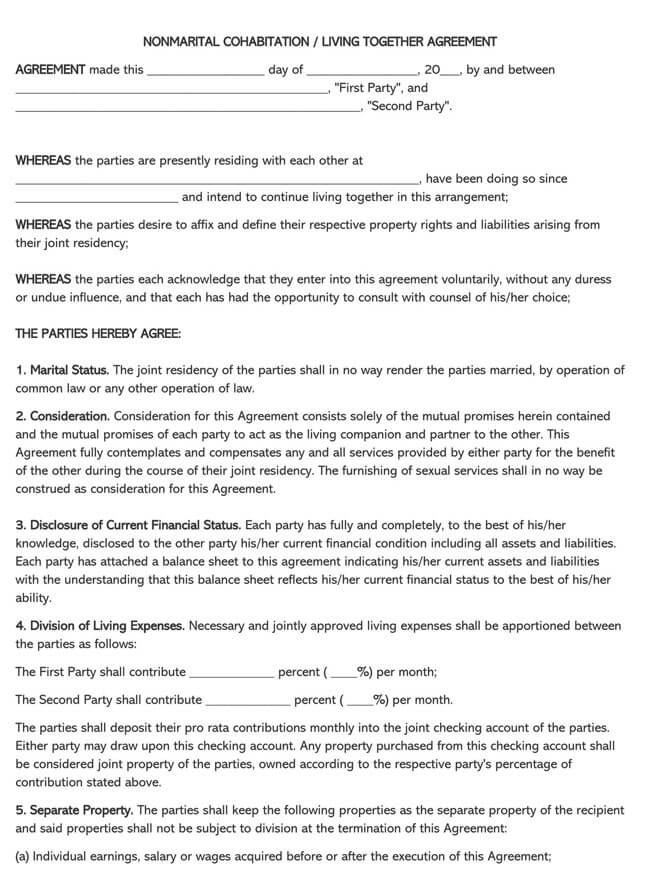
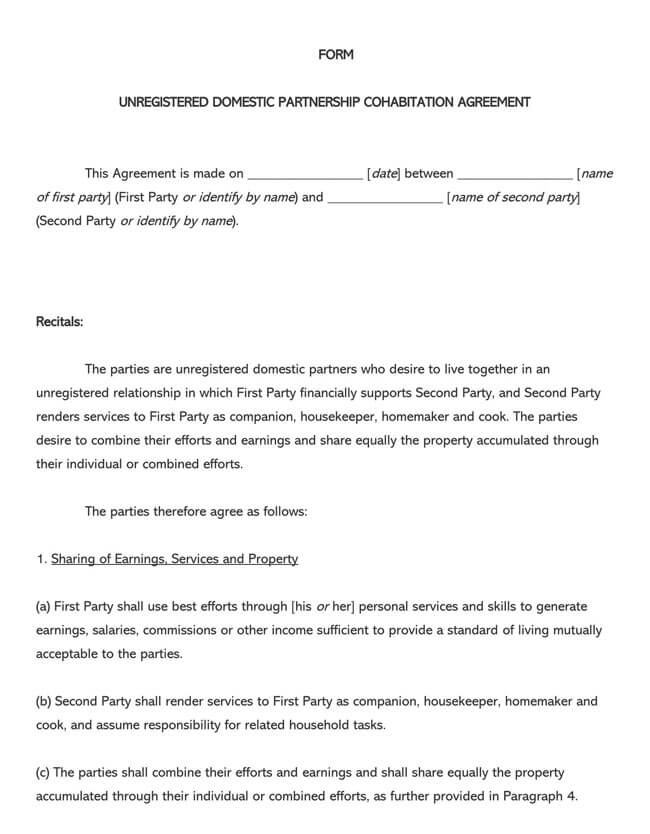
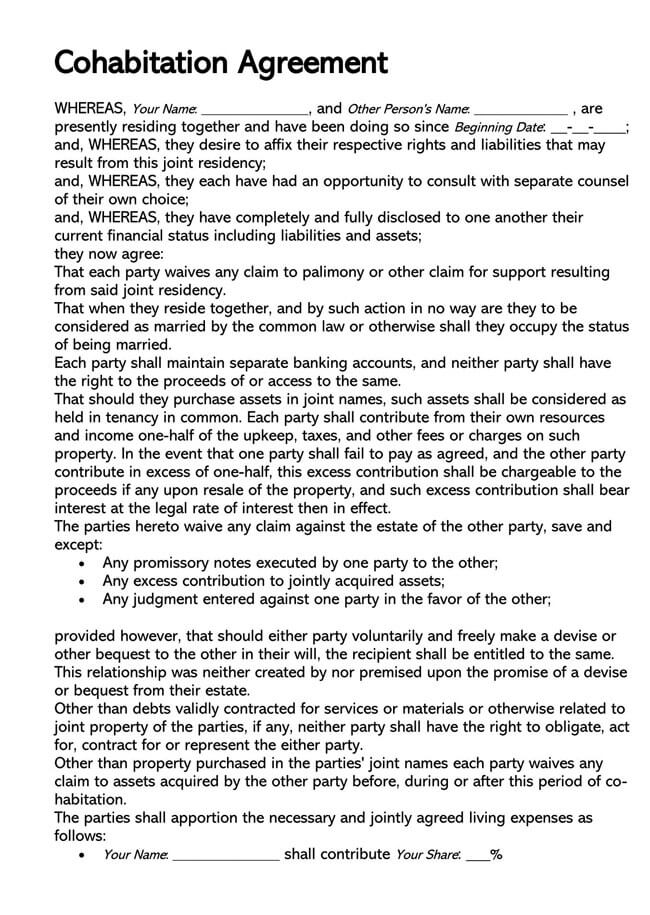
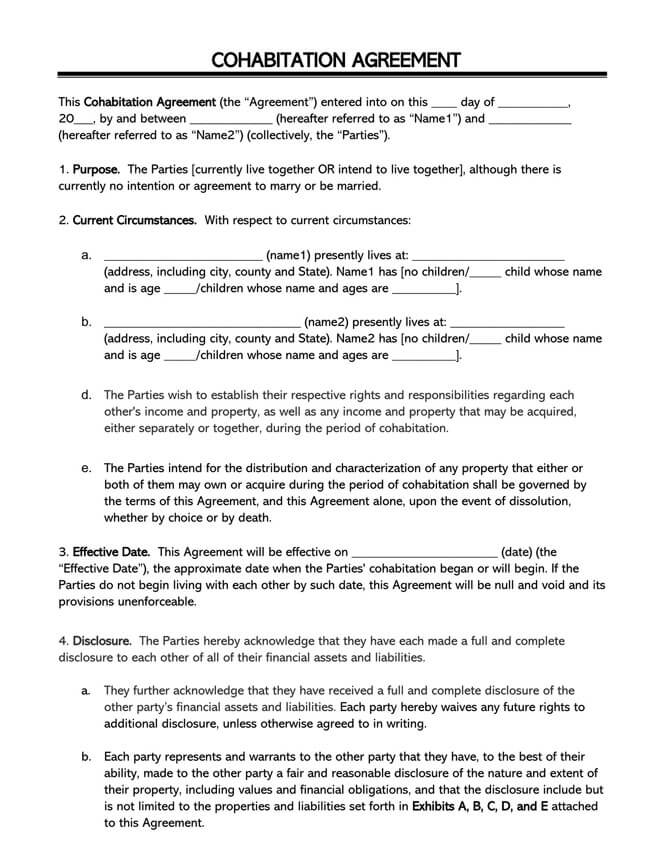
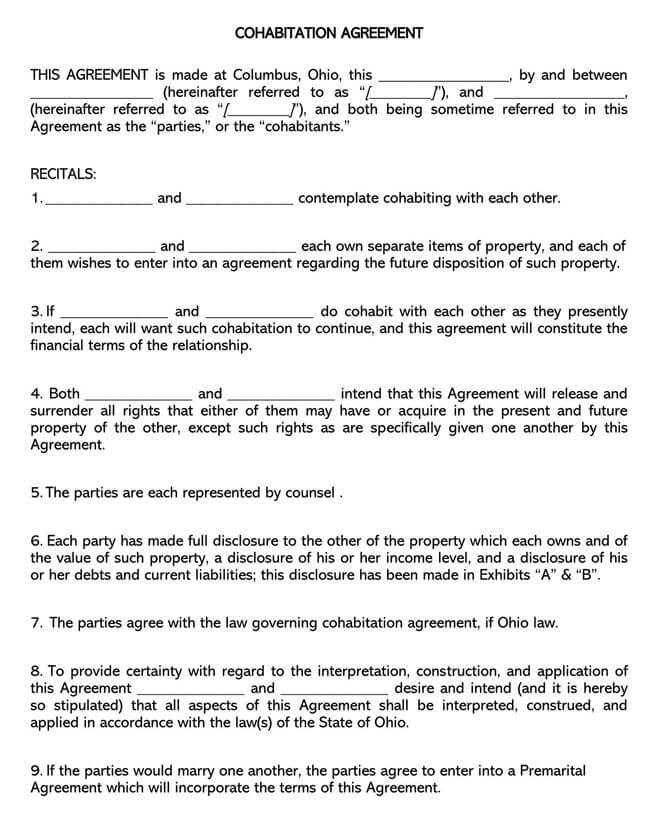
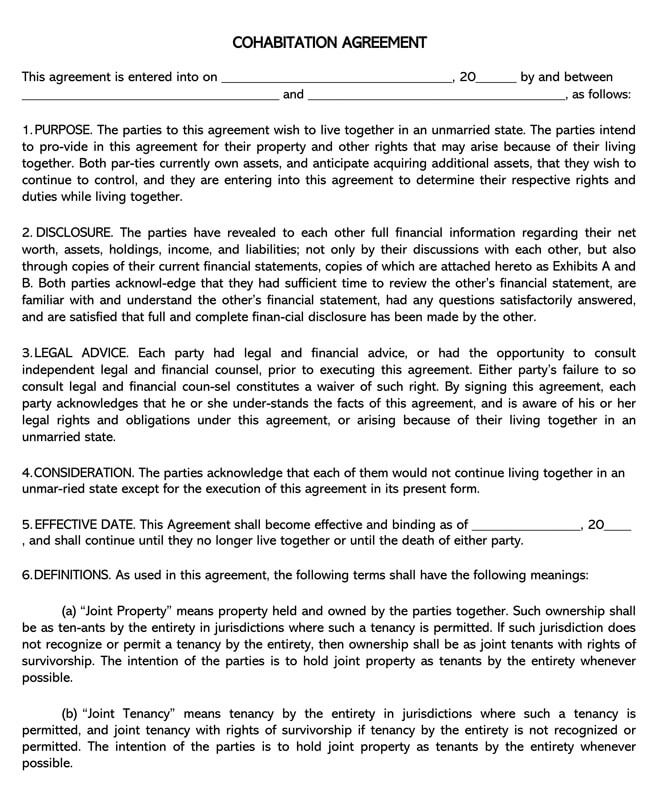
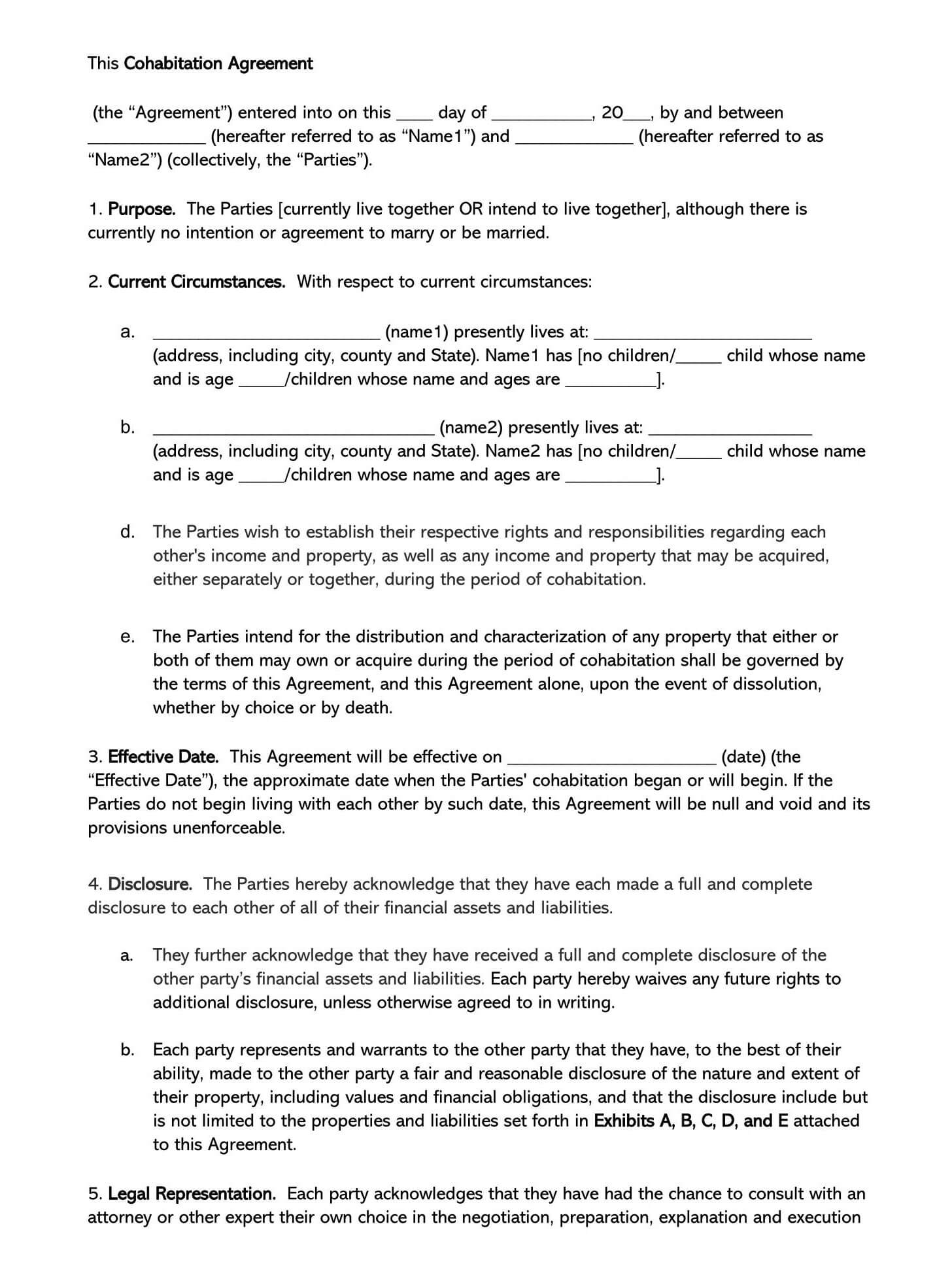
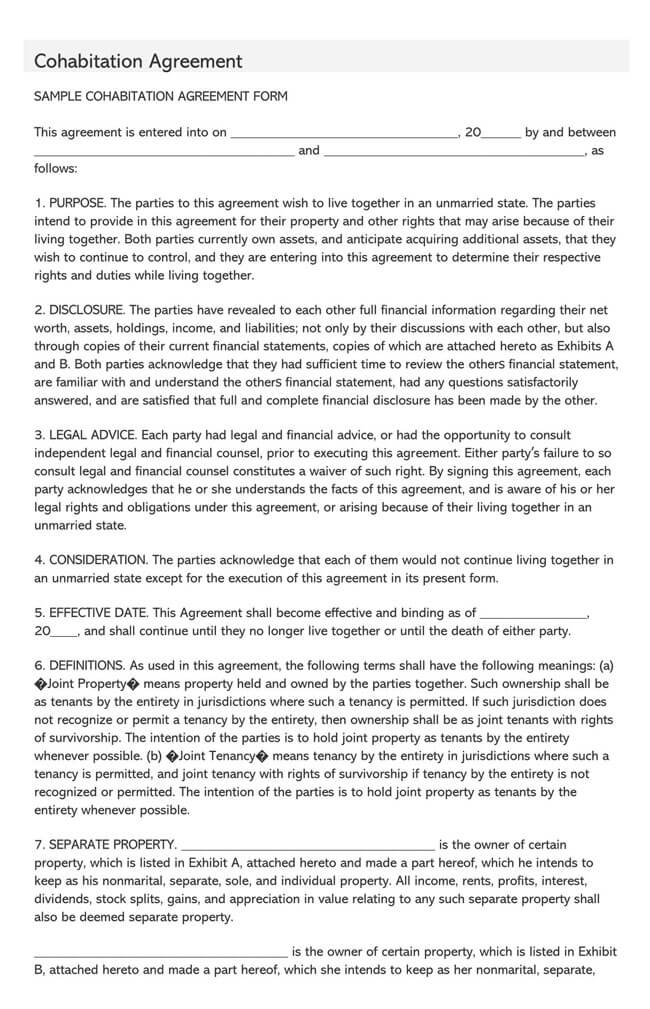
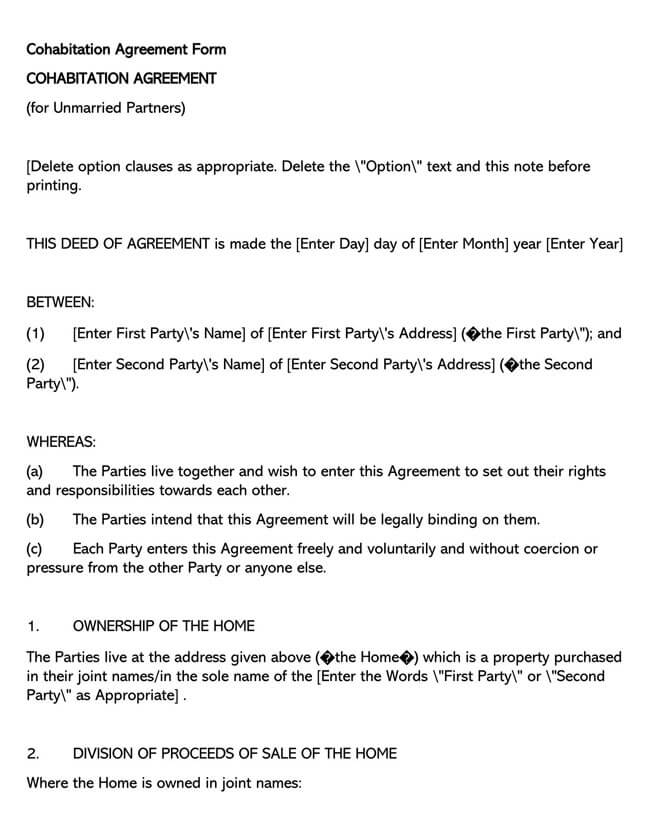
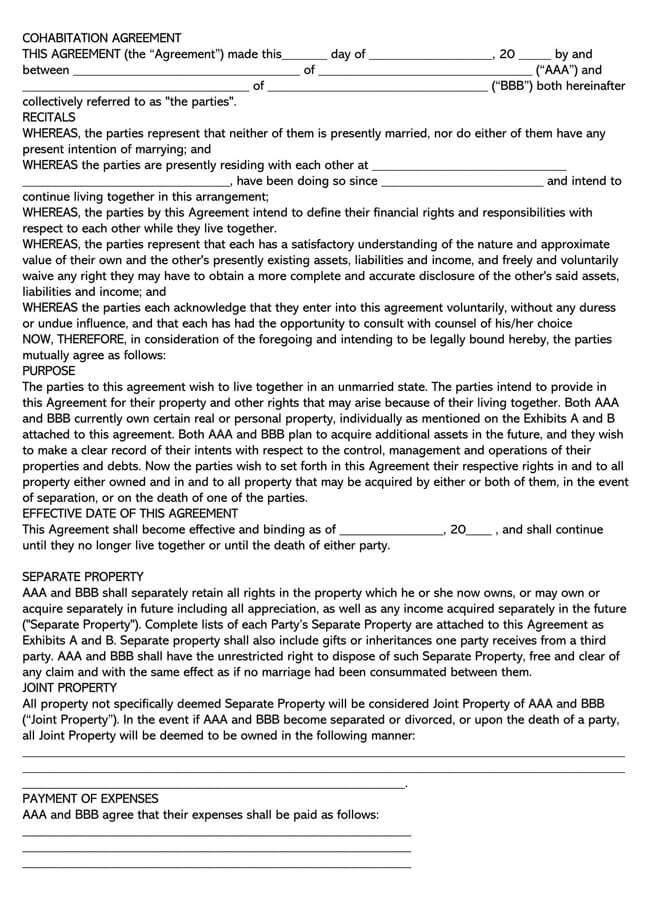
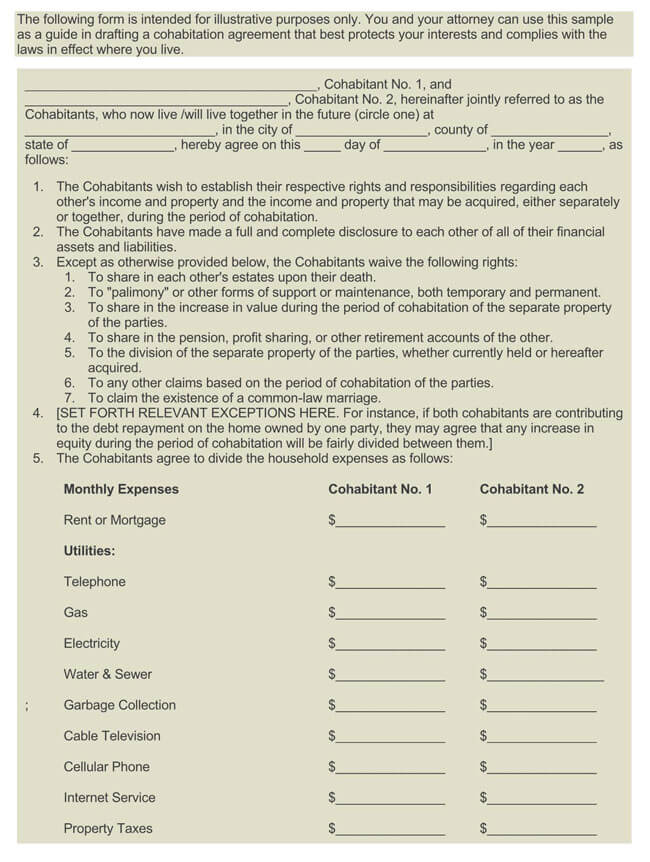
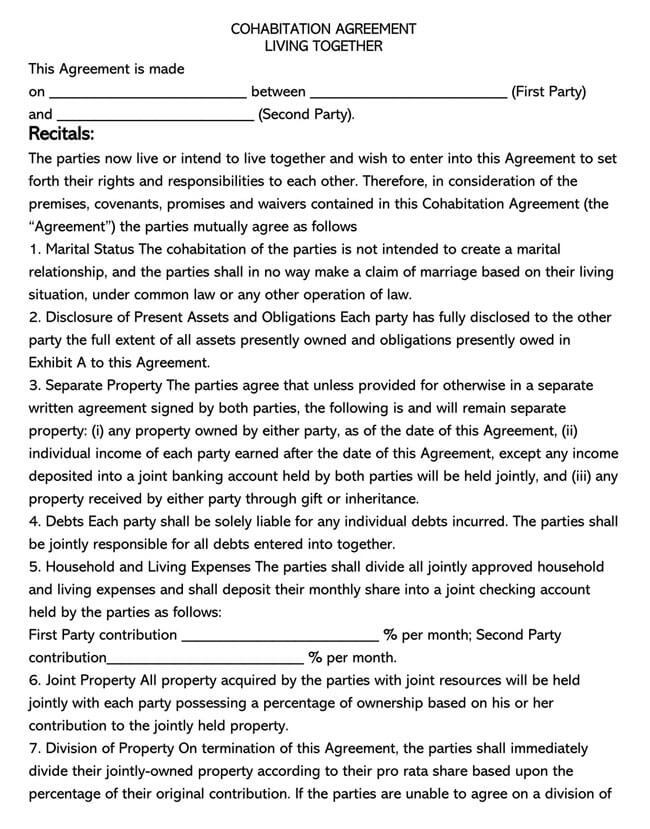
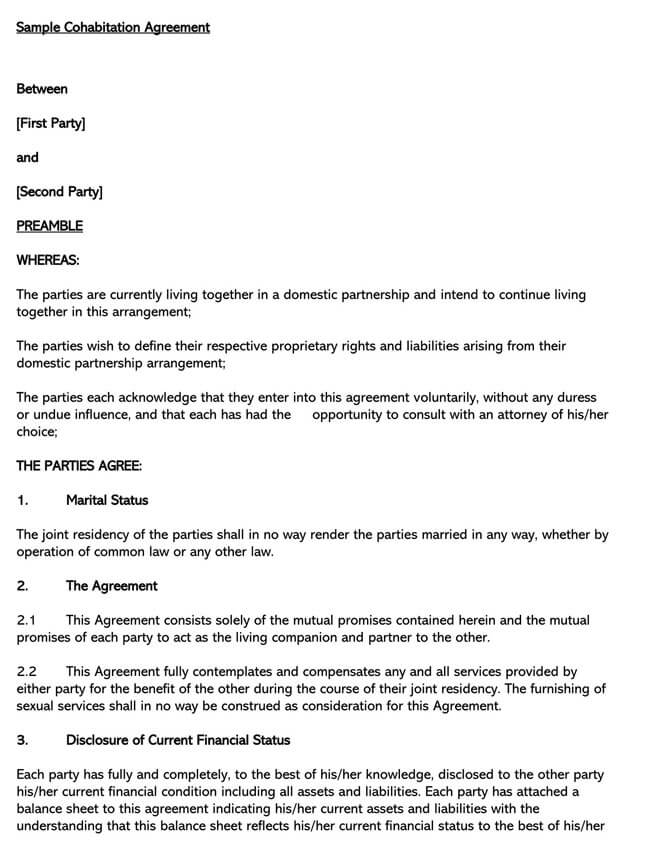
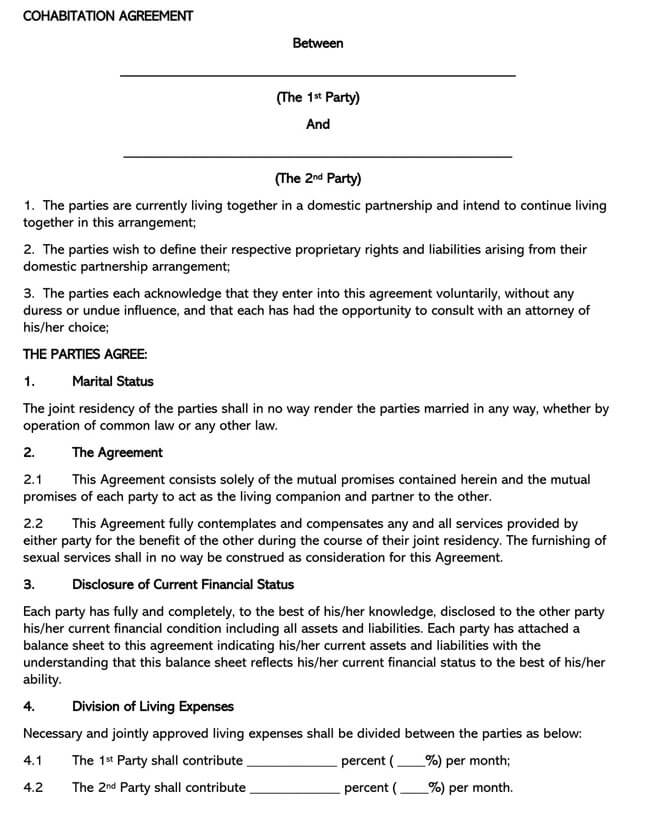
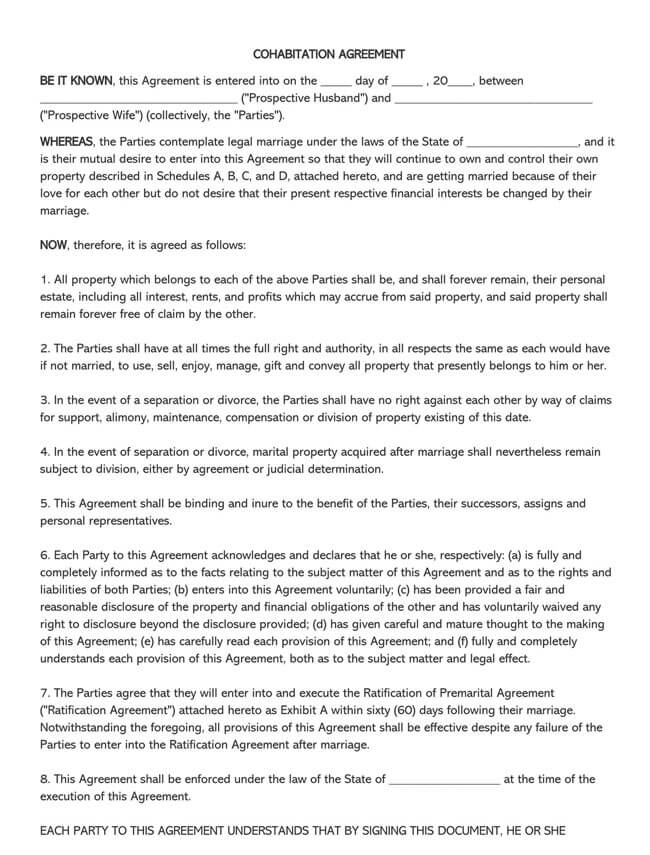
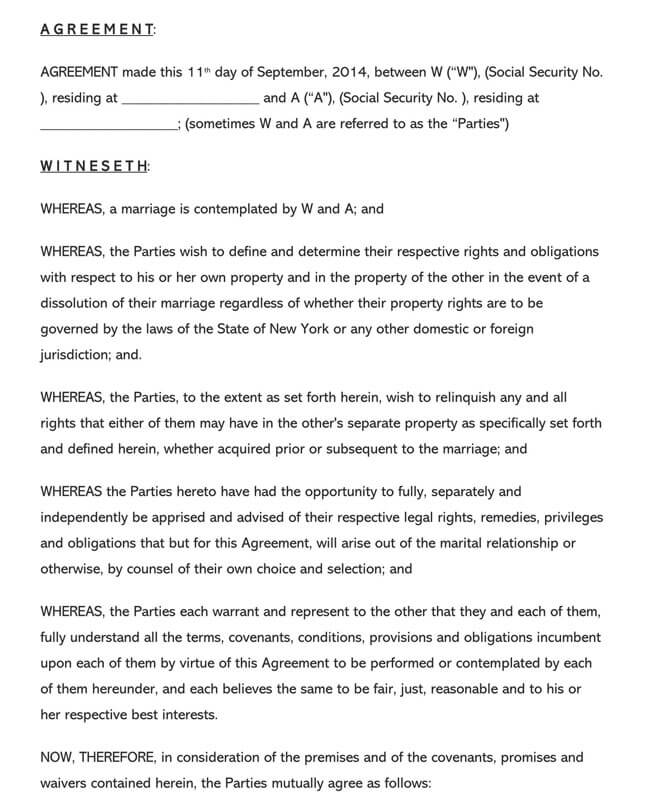
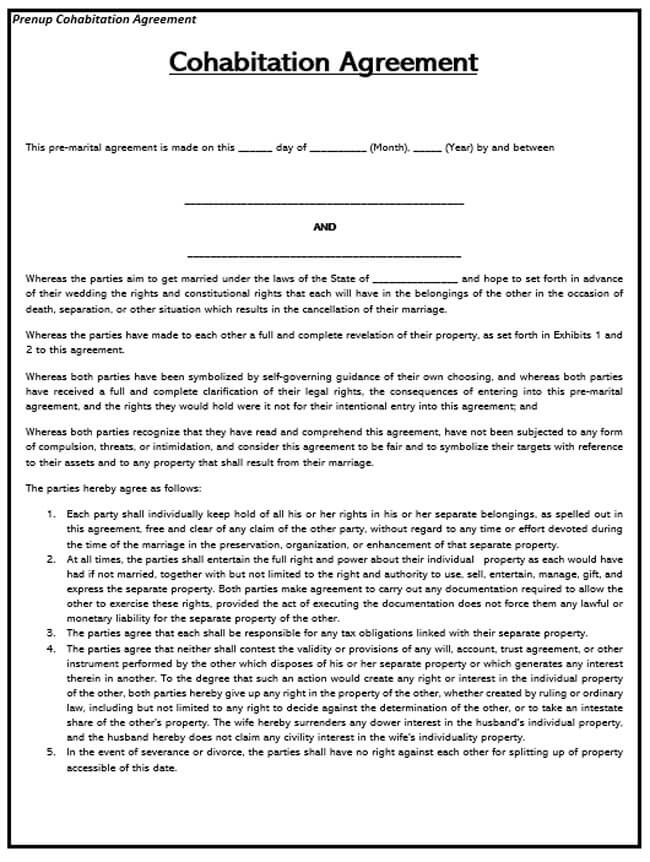
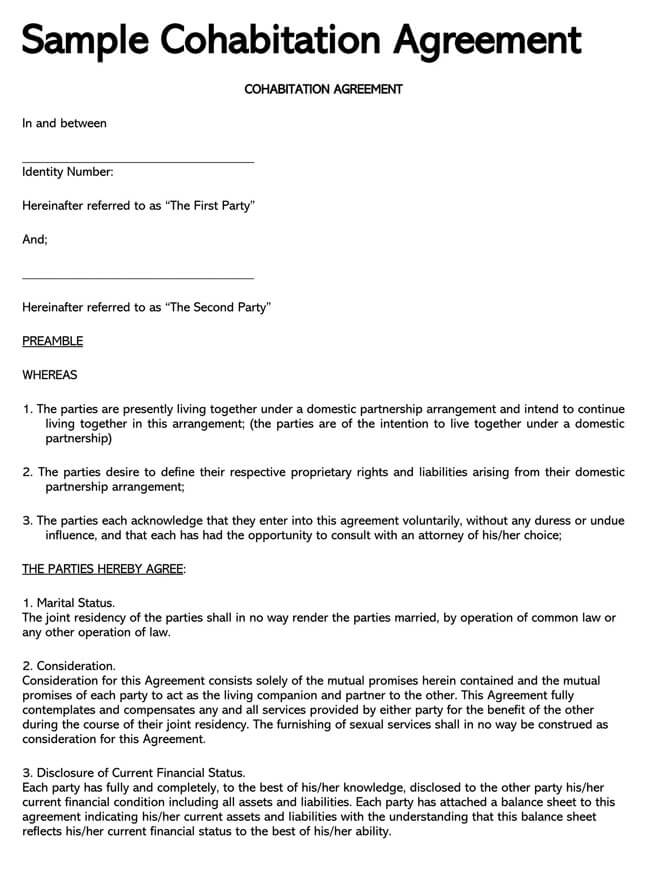
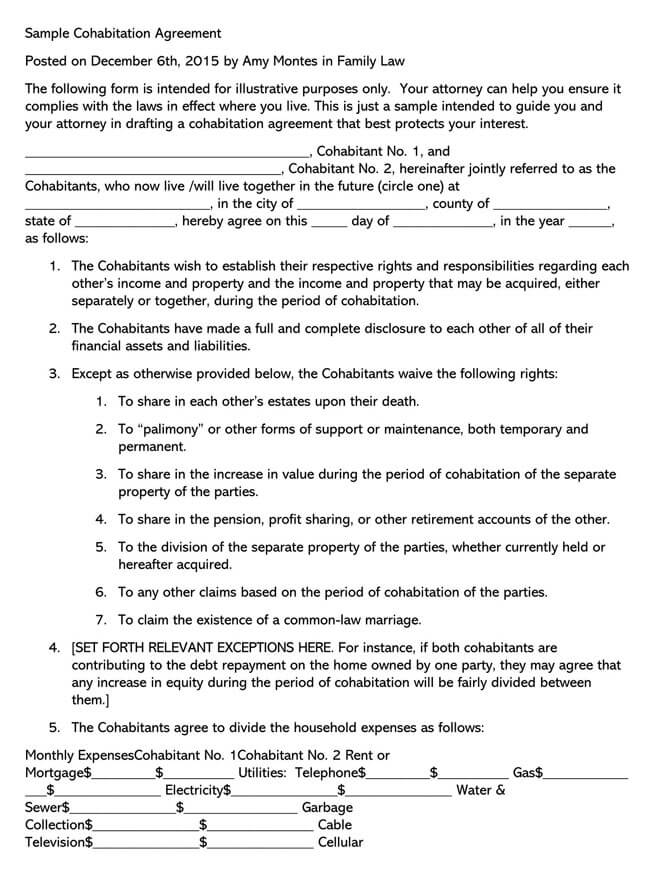
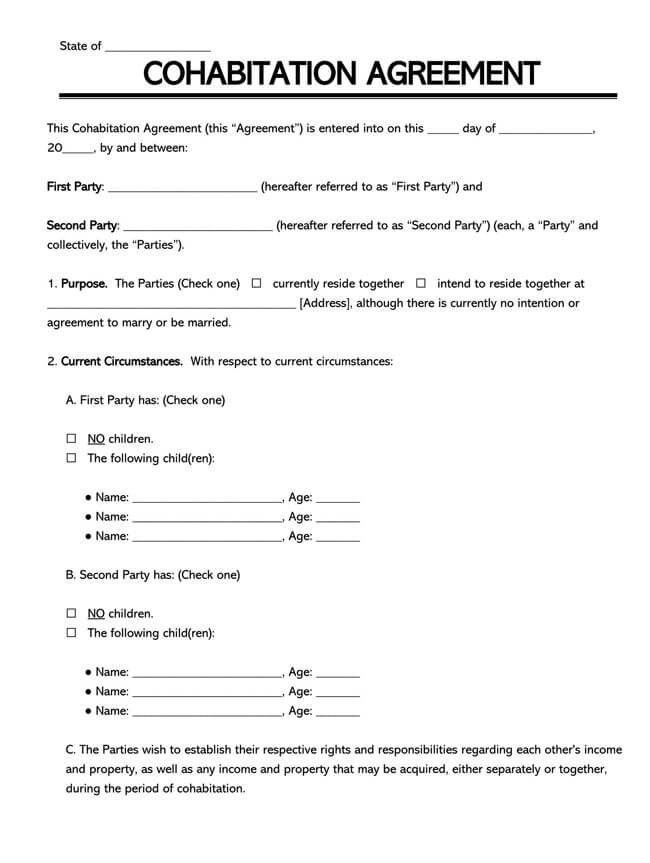
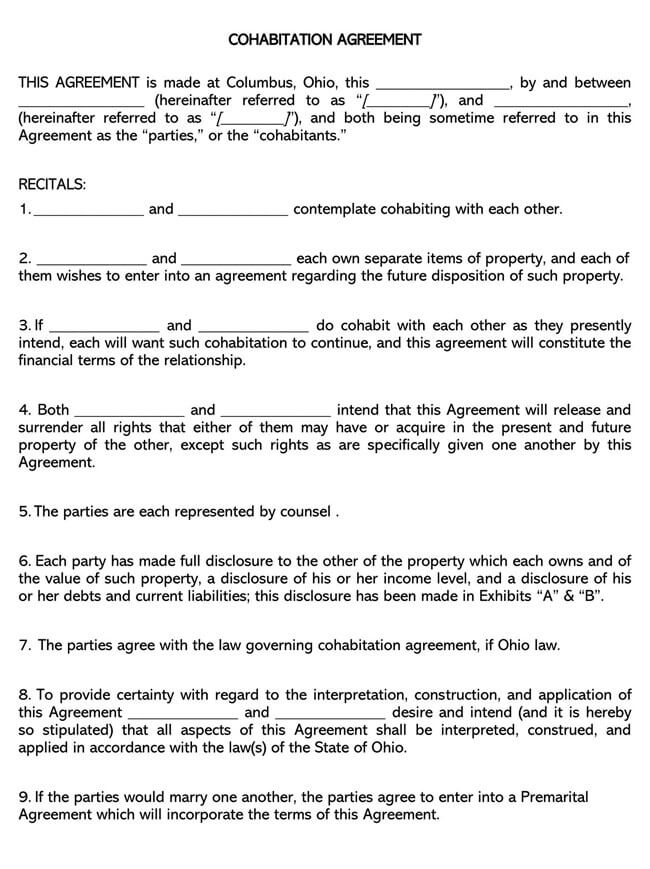
Cohabitation agreement vs prenuptial agreement
A prenuptial agreement is not similar to a cohabitation agreement.
A prenuptial agreement is only used when you and your partner are thinking about getting married.
Several states have laws that clarify that a prenuptial agreement will not be honored if the couple agrees not to marry eventually. On the other hand, a cohabitation agreement is used when you and your partner are not intending to marry.
Issues Addressed in Cohabitation Agreement
A comprehensive agreement addresses all of your current property and any potential property you might purchase and provides specific arrangements for how it will be shared. Although your agreement should discuss particular property issues involving your partnership, there are a few main issues that most agreements cover.
Distribution of assets
When you and your partner separate, the property that you owned before the cohabitation remains yours. In contrast, assets that you acquired during cohabitation will be shared 50/50 between you and your partner.
Responsibility of debt
If you have debts, or if you and your partner acquire debts during the cohabitation, it is important that you divide responsibility for those debts through your agreement. It is normal for both partners to have obligations before entering a relationship, such as student loans. Acquiring joint debts during a cohabitation, such as opening a joint credit card, is also popular. An agreement of cohabitation should specify how different forms of debt are split after a divorce, as well as who is responsible for making payments when you are still together.
Information regarding children
In regards to custody and child support payments, the courts always have the final say. If a court is ever asked to rule on a child custody or support issue, it may agree with the terms you’ve included in your agreement. Your agreement should specify who the children will live with, who they will spend holidays with, and how you and your partner will resolve child-rearing issues in the event of a divorce.
Support payments
Your cohabitation agreement should explain support payments clearly, either by stating that each of you agrees that no such payments will be made in the event of a divorce or by detailing any expenses that will be made. If you want to make payments, you must decide the terms, such as who pays, how much, and how long. When evaluating support payments, you should consider several factors, including the length of the relationship and whether one partner agreed to raise any children, leave the workforce, pay for or pursue an education, or make other contributions to the relationship instead of earning income.
Any other financial expectations
Apart from assets and debts, cohabiting with a partner often entails sharing income, expenditures, and shared financial interests and obligations. While some cohabitants have no intention of sharing money, there are others who willingly give and take funds from one another without accounting. You must discuss your expectations with your partner and include them in your cohabitation agreement.
Components of a Cohabitation Agreement
The main elements of a this agreement are:
- Relevant data: The agreement contains the name of the people who are signing it, the state in which they reside, and the date you and your partner signed it.
- Complete declaration: Acceptance that you have had the opportunity to review your partner’s financial position, including net worth, properties, holdings, revenue, and liabilities, before signing the agreement.
- Independent legal advice: This means you and your partner had the chance of consulting an attorney before signing the cohabitation agreement, it would be upheld in court.
- Information regarding payment of expenses: Before you move in together, discuss how you will share the rent or mortgage payment, electricity, groceries, and other daily costs.
- Separate and joint property: List any property you purchased before your cohabitation that you want to maintain as personal property, such as financial properties, household goods, cars, and other things. Likewise, mention jointly owned property with your partner as shared assets, which will be split between the two of you in the event of death or separation.
- Effect of separation or death: When one person dies or leaves, any property mentioned as separate in this agreement is usually not shared with the other person. Any property identified as joint will be shared with the other person. If you would want your spouse to inherit your assets, you should indicate this in your will.
- Effect of marriage: Specifies if the agreement is still in effect, will be terminated upon marriage, or changed before marriage.
- Signature and date: Both you and your partner need to provide a signature. Signing a cohabitation agreement is done in front of a witness/notary.
- Consent statement: It is a statement confirming that both you and your partner are entering into such agreement consensually.
Cohabitation Agreement-Is it Right for Me?
Yes, This agreement is right for you. Since the law usually grants no legal standing to cohabiting couples who are not married, this agreement is a way for you and your partner to determine their rights and obligations during and after the relationship. When you and your partner decide you will live together for a long time but do not want to marry, you can use a living together arrangement. An agreement helps you confirm which property will be handled as separate or shared for legal purposes, and it prepares all parties to consider how future property and profits will be shared in the future.
An agreement of cohabitation is considered invalid in the following circumstances:
- When you and your partner are married.
- When you and your partner agree to live together as a married couple after marriage.
- When you consider yourself as married in public.
Consequences of Not Having a Cohabitation Agreement
Cohabiting with your partner without having an agreement of cohabitation could lead to misunderstandings and legal issues.
Below are the consequences of not having a cohabitation agreement:
Forced to assume the debt of your partner
You may be forced to fulfill your partner’s debts when you separate if you do not have a cohabitation agreement. This means you could be liable not only for past-due rent and utility bills but also for debts owed on household goods and personal products. This agreement ensures that any assets you obtained before the relationship remain in your hands if the relationship ends.
Property settlement
Living together does not establish a formal partnership, nor does it qualify you for a property settlement if you split up or if either of you dies unexpectedly. An agreement of cohabitation states what happens to property should you and your partner separate.
Division of expenses
Parties who cohabit and engage in major property purchases, such as investing in real estate, risk losing any value they have in the property, particularly if one party enters a transaction without their partner’s consent or participation. Some states will offer de facto legal protections to partners who share certain characteristics or live together for a certain period. Unfortunately, this may be harmful to couples who believe their assets and debts will remain separate forever.
Related Documents
The following documents are related to a cohabitation agreement:
- Prenuptial agreement- Couples use a Prenuptial Agreement before marriage to highlight each person’s assets and property and how they will be divided if the marriage ends.
- Separation agreement- The separation agreement states the terms and conditions for couples who are separated and living apart.
- Roommate agreement- A roommate agreement is an agreement that is agreed between the tenants of a rental unit. The agreement establishes the terms, conditions, and obligations that each of the tenants agreed to. Roommate agreements are also known as roommate contracts.
Frequently Asked Questions
Yes. Cohabitation agreements are binding agreements if properly drafted and implemented, and signed as a contract. As a result, it is important to seek legal counsel before drafting an agreement.
A simple agreement like this could cost $500. A more complex agreement is needed if you want an agreement that includes child custody and child support, healthcare, estate planning, and inheritance.
Cohabitation and Marriage Arrangements can be examined and overturned by the court in certain cases, such as whether the agreement is unfair or was entered into under duress or intimidation.
Final Thoughts
Unmarried couples together have the option of drafting a variety of legal documents called cohabitation agreements to help protect their rights as a couple while also protecting their individual interests and properties. Since unwed couples who live together can one day break up, particularly outside of the legal ties and social institution of marriage, it is advisable to prepare ahead to avoid potential conflicts.
The agreement can also be used to decide how you and your partner will handle your daily finances when living together, such as how much each of you contributes to rent or mortgage and expenses and whether you can purchase life insurance for each other.
Cohabitation and marriage may have legal comparisons, such as information about the property and debt distribution, succession, or financial responsibilities. Non-intimate partners who choose to live together, such as friends, roommates, or relatives, may use a Roommate Agreement to describe their obligations instead.




